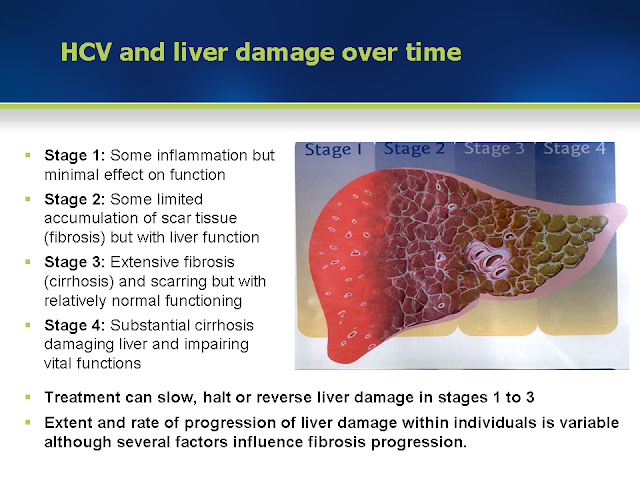What’s the Connection Between Psoriasis and Hepatitis C?
·
Psoriasis is a chronic autoimmune condition that causes a
rapid turnover of skin cells. Patches of skin irritation can appear on various
parts of the body. These patches may be:
- thick
- scaly
- red
- itchy
- painful
Though there’s no cure for psoriasis, researchers do know
that certain infections can trigger symptoms. For example, if you have the
hepatitis C virus (HCV), you may be at an increased risk of developing
psoriasis.
Here’s more about the possible link between these two
conditions.
What Is Hepatitis C?
Hepatitis C is a viral infection that spreads primarily
through contact with infected blood. Transmission may happen through sharing
needles or sexual contact with infected persons. HCV primarily affects the liver
and can lead to inflammation.
Many people who have HCV don’t experience any symptoms
until years after they’ve been infected. By this time, liver damage or
cirrhosis is often discovered.
What Are the Symptoms of Hepatitis C?
When HCV causes symptoms, they’re typically flu-like. In
the early stages, this can include:
- fatigue
- nausea
- a fever
- jaundice
- dark urine
- muscle pain
- joint pain
As the infection progresses, you may experience:
- bleeding
- bruising
- itchy skin
- weight loss
- swelling in your legs
- spider angiomas, or collections of
blood vessels near the skin’s surface
What Does Hepatitis C Have to Do with Psoriasis?
The link between HVC and psoriasis is
explored in a study published by the Journal of Dermatology.
Though having the virus itself doesn’t directly cause psoriasis, those who have
a predisposition may develop symptoms when the body is under stress from the
infection. HCV appeared before psoriasis in up to 91 percent of the 54 people who tested positive
for both HCV and psoriasis.
In other words, HCV may serve as a trigger for psoriasis
if you’re already genetically prone to getting psoriasis.
Prevalence
According to the Centers for Disease
Control and Prevention, there are currently about 3.5 million people with chronic HCV in the United
States.
Psoriasis affects men and women at an
equal rate. Psoriasis affects around 1.9 percent of the African-American population and 3.6 percent of the Caucasian population.
Are Genetics Responsible for Psoriasis?
How many people have both HCV and psoriasis? It’s hard to
tell. More studies are needed to explore the link between HCV and psoriasis, as
well as its prevalence in these populations.
What Are the Risk Factors for Psoriasis?
Psoriasis is a disease that doesn’t discriminate. It
affects women, men, and children. If you have a family history of psoriasis,
you may be at higher risk for it.
Other risk factors for psoriasis include:
- · viral infections, such as HCV and HIV
- · bacterial infections
- · stress
- · obesity
·
smoking
Talk with your doctor if you have any of these risk
factors and are experiencing psoriasis flare-ups or other skin irritation. If
it’s left untreated, you may develop complications such as:
- · psoriatic arthritis
- · diabetes
- · heart disease
- · kidney disease
- · high blood pressure
Treatment Options
Have you already been diagnosed with HCV, psoriasis, or
both? Since both conditions are chronic, management of symptoms is usually the
focus of any treatment your doctor will offer you.
Psoriasis Treatments
Psoriasis is a lifelong condition that can’t be cured,
though symptoms can come and go. The three groups of treatments available are
topical treatments, light therapy, and systemic medications. Your doctor will
help determine which group is best for you depending on the severity of your
symptoms.
You may try applying different corticosteroids, vitamins,
moisturizers, or retinoids to your skin. Light therapy, also called
photo therapy, involves exposing your skin to natural or artificial light with
ultraviolet wavelengths. If your psoriasis doesn’t respond to these treatments,
oral or injectable medications might be your next step.
Hepatitis C Treatments
Though most HCV cases do become chronic, you may have
success with early treatment. There are certain medications your doctor may
give you that can work to clear the virus from your system. You’ll need to take
these medications from 24 to 72 weeks. Additionally, you’ll need to be clear of
the virus for 12 weeks to deem the treatment effective.
Otherwise, you may eventually need a liver transplant.
It’s important to note that getting a new liver will not knock off the virus.
That new liver is also at risk of infection, so you’ll likely continue
antiviral medications after surgery.
Treatments for Both Psoriasis
and Hepatitis C
Some psoriasis treatments aren’t safe
if you have certain liver conditions. This includes those caused by HCV. In one study,
researchers found that certain topical medications can be effective for people
with mild irritation. Ultraviolet B photo therapy may also be helpful for people
with both HCV and moderate to severe psoriasis.
More studies need to be done in this area to find
treatment that’s safe and effective for people with both conditions.
When to See Your Doctor
More studies are needed to explore the link between HCV
and psoriasis. Then, doctors will know with higher certainty what treatments to
suggest when these conditions coexist. Regardless, don’t let your symptoms go
untreated. Each condition can worsen and produce greater complications the
longer it continues.
If you’re experiencing skin irritation that just won’t go
away, visit your doctor or ask for a referral to a dermatologist. Be sure to
share your complete medical history and include mentioning any previous
recreational drug usage, especially if you’re at risk for or might have HCV.
Your doctor will ask you about your medical history and
symptoms. Then, they’ll perform an exam and either prescribe a course of
treatment or send you to a specialist for further testing.

i like u site
ReplyDelete